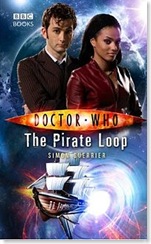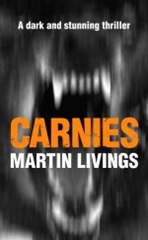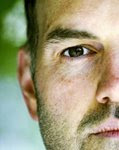So Kaaron, you’re pretty much in all the anthologies I’ve been buying recently: 2012, Paper Cities, Year’s Best Science Fiction and Fantasy – Volume Three; The Grinding House has just been revamped with two new stories and a swish cover and been released as The Glass Woman (see above) internationally. It’s all looking a bit impressive!
1. Kaaron, what’s your favourite colour does living in Fiji have anything to do with this current run of stories and how has Fiji itself affected you as a writer?
My favourite colour is burgundy. I think it goes well with my colouring, though my mother disagrees. She is also unhappy that I changed the spelling of my first name, because the numbers don’t add up. But I like burgundy.
There does seem to be a lot of me in print at the moment. I didn’t plan it that way; it just happened. The only story which is truly Fiji-inspired amongst those you list is the one in 2012. It’s set in the government flats in Suva I pass quite often. I’ll be setting more stories there, because it’s a fascinating place.
I don’t think my writing has changed since being here, but obviously the input is different, so that shows itself in the stuff I’m working on. Before I left Australia I started a novel set on a large island, and that has been easier to write in greater depth living here in Fiji.
2. I have read quite a bit of your work and, of course, love it all. You write dark fiction that is very much based in the world we live. Why is it that you choose these mundane settings and don’t go for fantasy or other worlds in your fiction?
I think my settings are mundane on the surface but are not-quite reality. My worlds are one step sideways of our world. Our world in the future or our world in the past, all slightly shifted so it is almost familiar, if you squint.
I’m attracted to these kinds of settings because I love to think about possibilities at many levels. What if this is true and that isn’t? What if this led to that which caused this?
I spoke to some Year 12 kids today about using ideas in their stories. They’re writing SF/Fantasy stories as part of their school year, and I wanted to give them the idea that SF/Fantasy is not just about the setting. I took in a bunch of Guardian newspapers and got them to read through and take notes of any news stories they found interesting. I told them about my story “His Lipstick Minx” (which, while set in the mundane world of an oil rig, is about men who wear lipstick which controls their behaviour and the tiny women who sit on their shoulders) and that I wrote the story after reading about a woman arrested for having lipstick in her purse.
They came up with some great ideas, after initial hesitation. The best thing was, not only did they write down the news article which inspired them, but half of them started on stories straight away.
Getting kids writing already eh? Great stuff!
3. Well this sort of leads me onto one of my favourite questions, which is that of advice. What advice do you have for those just starting out on the writing road (or who have been writing a while and are getting frustrated)?
There’s a lot of talent and ideas in children and young adults. I’m working with a couple of different groups here and my main aim is to get them to think about what they’re writing. To be unusual, passionate and original. We’ll see how it goes!
Some of my basic writing advice is this: make sure your communication is as clear as possible. I don’t mean the story itself, which, if you want it to be, can be convoluted, other-worldly, whatever. I mean the words you choose shouldn’t cause confusion. It’s as basic as this: Don’t pick names which sound the same. Check your spelling, grammar and punctuation. Make sure that the reader doesn’t get caught on a small point when you want them to be moving on to the big one.
It’s important to decide why you’re telling this particular story at this particular time. Is it the day something changed? The time a drastic decision was made? Or a terrible discovery?: You need to pick the most important part of the story, the most interesting, and have that as your centre. All the rest revolves around that; leading up to and leading away from that central point.
As for being published: don’t send anything out unless you’re sure it’s ready. Get readers to give you feedback. Join a writer’s group. Rewrite the thing four, five, six times until you think it’s good. Every story you send out goes on the record. Editors remember the bad as well as the good; make sure yours is good.
Read the market you want to sell to. Read as much as you can. Read broadly.
Check the online market pages (Ralan.com is the one most people know) and start sending. Be prepared for rejection, and if you get feedback from an editor, consider it well. You may not agree, or the editor may have a very good point which will turn your story into a seller.
An annoying one: Keep writing. Every day if you want, but, whenever you think, “I should be writing,” then you should be. Try not to put it off. Well, obviously children need to be fed, shopping needs to be done, cats need to be told not to scratch the couch. But scribble a note on the back of the shopping list. Think about your story while you’re stirring the Bolognese. Let the story you’re working on become part of your daily life.
I better stop there. I’m obviously in teacher mode. I’ll be telling you to sit up straight soon.
*sits up straight and smoothes his hair down*
Good advice indeed, although I’m not sure kids need feeding as much as they think they do…
4. Who/what started you writing? Who/what are your inspirations?
I started writing properly when I was 14, I think. I wrote my first real short story and a novel that year. I started because I had ideas, and sentences came into my head fully formed. I loved reading from the age of five and one of my early influences/inspirations is Grimm’s Fairy Tales. I read them at five! I wouldn’t let my son read “Bluebeard” till he was ten. Too terrifying.
My inspirations are many. S.E. Hinton inspired me because she was a teenaged girl who published a novel. Harlan Ellison because he wrote such bizarre, evocative stuff. Ray Bradbury, because of his wonderful way with dialogue and the social commentary he made in some of his work. Lisa Tuttle, because her stories are so well-layered and intriguing.
Ah, Bluebeard. Have you read the version by Angela Carter ‘The Bloody Chamber’? It’s excellent!
5. How does music feature in your writing life, do you listen when you write, or are you inspired by music?
I adore Angela Carter. I read her voraciously when I was in High School.
I often play music when I write. My favourites are Radiohead and Muse, because of the furious nature of their music. If I’m writing a first draft, it’s almost always to them. I also like Rufus Wainwright, The Athletes, Thea Gilmour, Fiona Apple, PJ Harvey, Nick Cave, Bright Eyes Lifted and My Morning Jacket.
The only music inspiring me at the moment is a band called The God Machine.
Did I answer that last bit right?
That last bit was perfect *grins*
6. What do you do when you’re not writing?
In my other life? I’ve got two kids, 9 and 7, who are extremely interactive and great to be with. I’ve got a husband as well, who has the same qualities. So lots of family time.
Living in Fiji there are plenty of adventures to be had. There are people here from all over the world, and because many of us are here short-term, you make friends easily. I love breaking bread with people, drinking wine, ranting on about something which has offended me.
I love to read. A Japanese friend gave me a book called Botchan, about a teacher in a remote country school far from Tokyo, written a hundred years ago. I’m loving it. It’s funny and revealing and an easy read.
I’m crocheting my daughter a jacket. I do like to crochet. Sorry if that destroys my image. I like crocheting while watching crap on TV. I feel like I’m not wasting my time, then.
I watch crap on TV. Fiji TV is particularly bad. We bought back Damages, Dexter and The Tudors from Australia, though, and I’m enjoying those.
Dexter is wonderful ‘Crochet Kaaron’!
7. What have you got lined up then, what’s the plan for your writing over the next few years (supposing you have one)?
Plan for writing is to finish the novel I’m working on (almost done), write a bunch of the short stories I’ve got on the boil, start the next novel, and sell the lot!
Easy peasy!
8. After Fiji is it straight back to Oz, or have you any plans for further travel?
We'll go back to Canberra for a few years then play it by ear. The kids' schooling is important, so I'm thinking they'll probably do High School in Australia. After that, who knows!
Thank you so much for taking the time to do this Kaaron and I hope you get better soon. I’ll be keeping an eye on your career (both as reader and publisher) and I wish you every success in the future!





